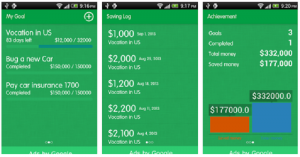Getting people to understand or share your vision is usually not the easiest thing for most entrepreneurs, let alone getting them to contribute to or support your initial funding. This is where personal finance or learning how to raise your personal initial funding comes in handy. I will share a few tips, apps and sites that can help you along the way.
Tip 1: Keep track of your monthly expenses
There are several mobile applications that can help you monitor your daily, weekly or monthly expenses—I use “Expense Manager”. But you must know it requires commitment and consistency. Of course, the Expense Manager will not update itself. You have to be prepared to enter every transaction yourself. Yes! Every transaction without procrastination. Oftentimes, your inability to save is rooted in not knowing how or when to spend— a problem well understood is almost solved.


Tip 2: Do not save what is left after spending, rather spend what is left after saving.
If you start spending with the hope that you’ll save what remains, normally, what remains is zero. As long as money to spend is available, the countless things you can spend it on are in abundance. It is usually more practical to do a “goal-based” saving. This means tying or pegging the savings to a goal or project. A lot of apps come to mind but you might prefer Savings Track.
Tip 3: Have a budget and follow it.
Having followed Tip 1 in managing your personal finance, with Tip 2 in view, you must seek to have a budget—which is a documentation of your inflow (money you get) and outflow (money you spend).
Nothing should be left out. If chewing bubble gum is what increases productivity at work, include it in your budget. This goes for airtime recharges and hair styling too.
Of course your savings is a part of your budget. An amazing app that can help with achieving your goal of raising initial funding is Wallet.
Tip 4: “How many hours do I need to work to pay for this”?
Another way to manage your personal finance is asking the right questions. If I work everyday from 9am to 5pm (8hours) from Monday to Friday (5days), it means I work 40hours per week. Approximately, there are 4weeks in a month which means I work for 160hours per month. So if I earn ₦120K per month, it means I earn ₦750 per hour. If I decide to have some fun and I get a pizza for ₦3K, ice cream for ₦1.5K, play some games for ₦1.2K and get just a drink for ₦300 totaling ₦6K, at the rate of ₦750 per hour, I should have spent 8hours of my worktime for just a few hours—at most 4hours of pleasure. Always remember your goal—saving for initial funding.
Tip 5: Do It Yourself!
Don’t “eat out” your future—eating homemade meals helps you save more money. Eating out is one of the biggest impediments for most people when it comes to saving.
True, you can only do so much, lest you become a jack of all trades and master of none, but learning/developing skills that will enable you do most things yourself is paramount, if you are saving towards getting your initial funding. A site that comes to mind, wikiHow, teaches you how to do anything. With some level of planning and discipline, doing it yourself is a habit that will yield results and save you more money.
There are no perfect ways to learning how to save or spend wisely but learning to leverage on technologies and tools around us is a sure way to get optimal results. If you wish to know more download the article personal finance for individuals and entrepreneurs.






